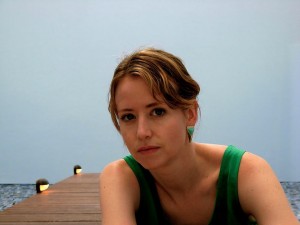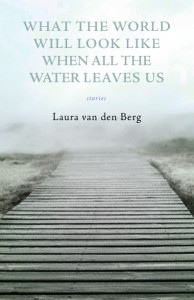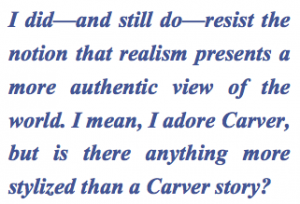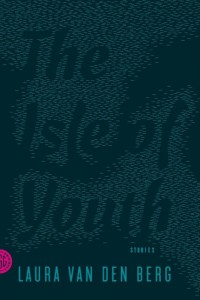 Laura van den Berg has published three short stories in American Short Fiction. In November, her second collection of stories, the scintillating The Isle of Youth, will be released by Farrar, Straus and Giroux.
Laura van den Berg has published three short stories in American Short Fiction. In November, her second collection of stories, the scintillating The Isle of Youth, will be released by Farrar, Straus and Giroux.
The book has elicited raves in advance of its publication. Kirkus Review calls The Isle of Youth “mesmerizing.” Publishers Weekly says, “If ever there was a writer going places, it’s Laura van den Berg.”
The Isle of Youth explores the lives of women mired in secrecy and deception: a newlywed caught in an inscrutable marriage; private eyes working a baffling case in South Florida; a teenager who assists her magician mother and steals from the audience. Each of them will do whatever it takes to survive.
Laura van den Berg was raised in Florida and earned her M.F.A. at Emerson College. Her first collection of stories, What the World Will Look Like When All the Water Leaves Us (Dzanc Books, 2009), was a Barnes & Noble “Discover Great New Writers” selection, longlisted for The Story Prize, and shortlisted for the Frank O’Connor International Award. She lives in the Boston area and is at work on a novel.
DL: It’s been a huge year for you: You got married to the writer Paul Yoon, you moved from Baltimore to Andover, Massachusetts, and you’re publishing The Isle of Youth. Let’s address the fun stuff first. What’s it like being with another fiction writer? He published his second book, Snow Hunters, this year as well. Do you ever feel competitive with him? Do you share your work with each other first, or wait until later drafts? Do you think it would it be easier being with a non-writer, or at least someone who doesn’t write in the same genre?
LvdB: I would say being with a writer—or at least the writer I’m with!—is largely great. Our work and the way we work is quite different, as is the way we move through the world, and I think that’s all very good; it would probably be harder if we were too similar, or aspiring to exactly the same thing, in terms of both the work and the life. We are only human, so of course it’s natural to feel competitive at times, but it’s taught us to resist the urge to compare and to embrace doing our own  thing: the sooner any writer can learn that, the better off they’ll be. And I think we’d be nuts if we didn’t feel wildly grateful to be publishing second books at all, let alone in the same year (bizarrely this is the second time this has happened; our first books both came up in 2009). I mean, really. It’s kind of ridiculous.
thing: the sooner any writer can learn that, the better off they’ll be. And I think we’d be nuts if we didn’t feel wildly grateful to be publishing second books at all, let alone in the same year (bizarrely this is the second time this has happened; our first books both came up in 2009). I mean, really. It’s kind of ridiculous.
I frankly can’t imagine being with a non-writer. After our honeymoon this summer, I immediately took off for a month, to go to a colony to work, and my better half totally understood. Originally we weren’t taking a honeymoon at all! I was supposed to be at colonies for all of June and July, but then the June residency fell through and we had a chance to take a trip together. Had I told a non-writer that, hey, I know we just got married and all, but instead of taking a honeymoon what I’d really like to do is go off by myself and work on my novel for two months, I suspect I would have been divorced on the spot.
I haven’t given a lot of thought to the question of genre, to be honest. I’m sure there would be advantages, but it’s nice that we can speak the same language. Also, we have really different taste and are often following very different paths when it comes to the fiction being published, so sometimes it feels like we’re in different genres!
As far as sharing work goes, we met in our early twenties, when we were first starting out, and used to exchange drafts all the time. Everything we wrote, the other person saw and commented on. We’re a bit older now, more cognizant of who we are as writers, and need the affirmation a little less, I think, so we’re starting to share work more sparingly. We are also a lot busier than we were in our early twenties, so that’s part of it too.
DL: I think of you as still very young—30 years old, yet you’re already publishing your second book. Then again, you’ve been at this a long time, writing seriously, at a high level, for over a decade, doggedly producing new work. You went to the Bread Loaf Writers’ Conference before finishing college. How did you even hear about Bread Loaf? Where did you get your discipline, your drive to work so hard?
LvdB: Well, my parents certainly deserve some credit. They have always been big believers in the power of hard work. When I was a kid, my dad used to say, When the going gets tough, the tough get going. That’s the kind of outlook I grew up with—good to be tough, good to be dogged.
Also, I had something of a non-traditional education. I had a pretty rocky adolescence and never graduated from high school—I got a GED and then went to night school for my B.A. For a long time, I was enormously self-conscious about this. I felt like I had missed a lot. I felt undereducated, underqualified. Eventually I shed that insecurity, but I still have a lingering need to prove myself to myself, day in and day out. If that anxiety becomes overblown, it can be damaging, but in the right dose, it’s great fuel.
Luckily for me, I was able to take those night classes at Rollins College, a very good liberal arts college in my hometown, with a strong creative writing program. Which brings us to Bread Loaf. One of my professors, a writer named Philip Deaver, suggested I apply to Bread Loaf. I had no idea what Bread Loaf was, but applied anyway, as a junior, and was rejected. I applied again as a senior and got in. I knew Bread Loaf was a writers’ conference, but what was that? I didn’t come from a literary background, so I didn’t know. I was thrilled to be going, but was also thoroughly terrified once I arrived. I can remember going through the check-in and just kind of nodding dumbly at everything, too petrified to say a word!
DL: What do you think are the most important lessons you learned about writing at various stages: undergrad, writing conferences, grad school?
LvdB: I learned a lot from all those experiences, benefited a great deal from the wisdom of my teachers and classmates. Certainly I learned a lot about the importance of persistence and generosity and community.
The workshops had an enormously positive impact on my reading life. Before going to graduate school, for example, I had not ever read a work of contemporary literature in translation. As a grad student, I remember taking a class on the contemporary French novel and reading all these esoteric French novels and just loving it.
In a global way, one thing the “workshop system” taught me was when to push back. I arrived eager and pretty receptive to critique, even when it was hard to hear, because I knew I wasn’t yet writing the kind of stuff I wanted to and I really wanted to get better. But over the years, when you combine undergrad and MFA and conferences, I was exposed to a wide range of teaching styles—which amounts to a vision of how that individual believes fiction should operate—and occasionally I’d encounter a vision that didn’t sit well with me. And that was so great! It gave me a chance to think about what exactly I was resisting and why; I was forced to define my own aesthetic in much sharper terms.
DL: Which begs the question: How would you define your aesthetic now? How has it evolved since you started? What aesthetic biases did you resist?
 LvdB: It’s still evolving, to be sure, but I was very much a realist when I started out and gradually moved away from that, became more interested in fiction that occupied the territory between realism and non-realism, where reality has a tilted feel. Weirdness abounds.
LvdB: It’s still evolving, to be sure, but I was very much a realist when I started out and gradually moved away from that, became more interested in fiction that occupied the territory between realism and non-realism, where reality has a tilted feel. Weirdness abounds.
In terms of what sparked that evolution, it all goes back to reading. For a long time, I didn’t know anything but realism, so that’s what I wrote. When I discovered people like Jim Shepard and Aimee Bender and Kelly Link and George Saunders, my understanding of how fiction could operate, what was “allowed,” expanded. That whole idea of “writing what you don’t know” was a huge revelation and ended up being really important, since I am almost always writing what I don’t know (bank robbers, acrobats, private eyes, etc, in the case of Isle)—but of course there’s a lot of emotional autobiography mixed in too.
As a reader, my tastes are pretty varied and there are so many realists I love, but I did—and still do—resist the notion that realism presents a more authentic view of the world. I mean, I adore Carver, but is there anything more stylized than a Carver story? I have trotted out this Steven Millhauser quote, from an interview in Failbetter, before, but it is super great, so here we go:
I mess with reality in the name of reality. Another way of putting it is that I don’t mess with reality. I mess with the assumption that reality is perfectly captured by middle-of-the-road realist fiction. I’d argue that the conventions of the realist story don’t begin to do justice to the blazing thing that deserves the name of reality.
I don’t think the Millhauser quote is a knock on realism—this becomes apparent if you read on a little—but rather a knock on assumptions made about realism. But actually what I love most about that passage is the phrase “the blazing thing.” In the end, all the labels strike me as limiting, insufficient. I don’t think about them much when I’m reading; I just want to feel the force of that “blazing thing.”
In the classroom, I feel like my obligation is to try and understand the best version of a student’s vision and guide them in that direction. And if you see them gesturing in directions they might not even be aware of, bring it to their attention. What is the most interesting, most exciting moment in this story and what would happen if that quality were magnified? Start the conversation from what you see happening within the work, essentially; make that the fuel. Often easier said than done, and I’m naturally a better reader for some kinds of work than others, but I do think if you’re only able to read through one specific lens, it can be problematic in the classroom, or at the very least limiting.
DL: I recall, however, that right from the start in graduate school, you were writing long stories that took place in faraway lands, with characters whose backgrounds were far removed from your own. You had already—and, I think, unconsciously—given yourself license to write what you didn’t know at 20 years old. Are you more conscious of the type of work you produce now, in relation to stories you’ve written in the past? Are you mindful of how you will fashion an oeuvre over your career?
LvdB: I think I started discovering a lot of that the summer before I started my MFA, when I was 22 or so. I seem to remember that being a very generative summer for me. You were my first workshop teacher, and I remember coming to your class that fall having a bunch of stories all ready to go up.
I would find it utterly paralyzing to think about career type stuff when I’m working on something new. I’m really just following whatever obsession I’ve been struck by and seeing where it leads—at least initially. At a certain point, I step back and start thinking more methodically about the overall trajectory of the project at hand, but again more in craft terms as opposed to thinking of how it might fit into a body of work.
I do aspire to get better with each book, and so that’s what I wanted for The Isle of Youth, for it to be a better collection than my first; I wanted the stories to go to a deeper place, to be more ambitious, more rigorously truthful.
 DL: What were the particular obsessions that led to The Isle of Youth, and what were the initial reactions to the stories? Do you have writer pals you share drafts with? Was it easier to write these stories, or were they more of a struggle?
DL: What were the particular obsessions that led to The Isle of Youth, and what were the initial reactions to the stories? Do you have writer pals you share drafts with? Was it easier to write these stories, or were they more of a struggle?
LvdB: On the surface, the stories are connected by subject matter: private eyes working a case that takes a mysterious turn; a teenage magician’s assistant who steals from her audiences; twin sisters who swap identities and become ensnared in the Miami underworld. I joke that this is the book where I worked out all my wayward impulses! There’s also a lot I find intriguing about noir and I wanted to pull in some of those qualities. On the interior level, I wanted to explore the problem of inner mystery, and by that I mean the mystery of our own actions and motivations—why do I do what I do? How can the people closest to us, the people we have maybe even known for all our lives, remain so fundamentally unknowable? I also wanted to write about Florida, where I’m from (several of the stories in Isle are set in Florida). Only somewhat recently have I been able to fully appreciate what a peculiar, interesting, and singular place Florida is.
But again, these weren’t things I was super conscious of when I was drafting. I was just rolling along, trying to put in my daily hours.
I can’t say The Isle of Youth was easier than my first collection (is anything in writing ever easy?), but perhaps it felt easier, or seemed to happen faster, because I wrote the stories alongside a novel I’ve been working on for a while, whereas when I was working on my first collection that was the only thing. I didn’t intend to do another story collection so soon, but every so often I would take a break from the novel and write a few stories and eventually I realized I was writing not just miscellaneous stories, but another collection.
I do have readers that I share work with, a small group of about five writers I either met in graduate school or someplace out in the world. I do think that is one of the most important things a writer can get out of grad school (or a good summer conference), smart readers who, if we’re lucky, also turn out to be long-haul friends. And god knows writers need friends.
DL: You’re also working on the fourth or fifth draft of your first novel. How has the process of writing a novel differed from writing stories? Was it intimidating?
LvdB: Initially I approached it in the same way I would write a story, in that I wrote a first draft relatively quickly and then stood back and started to consider what I had on the page. But I had failed to take into account that having a 20-page mess on your hands is very (very!) different from having a 300-page mess on your hands. It took me a long time to understand what the book is about, and I lost a lot of time undoing what I had done in that initial draft and, in some instances, going down the wrong path for far too long in revision. I probably should have spent more time mapping things out, but my process is also just woefully insufficient.
DL: Willing to say what the novel is about?
LvdB: Why yes! It’s called Find Me, and the story unfolds in the wake of a memory-destroying epidemic that has devastated America. Joy, a young woman struggling with a troubled memory of her own, has been sent to a hospital on the frozen plains of the Midwest—she is among a small segment of the population who appears resistant to the sickness—for scientific study. When the hospital turns out to not be the haven Joy thought, she escapes, journeys from the Midwest to the southernmost edge of Florida, where she has reason to believe she can find her mother. Also: there are houses with secret tunnels and ghost twins and a psychic and a whole lot of forgetting.
DL: What about on the sentence level, novels vs. stories? What matters to you most?
LvdB: I’ve come to think—especially since I write a lot in the first person—that voice sets the parameters for a lot of those other elements, imagery, style, syntax, rhythm, and so on. In both novels and stories, getting the voice right is hugely important, as many of those other decisions grow out of whatever that voice is.
DL: Knowing what you know now, what advice would you give to your 20-year-old self who is about to embark on a writing career?
LvdB: My 20-year-old self could have used a lot of advice, not that she would have listened. Here are my top four:
1. Don’t underestimate the importance of community. Invest in your community. Respect it. Be kind, and help people whenever you’re able (but don’t sweat saying “no” when you need to).
2. Keep your eye on the ball, which is and should always be the work. The successes and the disappointments are all ephemeral. Enjoy the successes (you earned them!), but don’t get distracted. And when things are feeling rotten and hopeless, dig in and keep working. Turn your anxiety into fuel. That is the way out.
3. You only have a few precious years before the Internet becomes THE INTERNET. Spend every free moment reading (and while you’re at it, read more literature in translation).
4. No amount of accolades will fix you as a person. That you have to do for yourself.
Don Lee’s latest book is the novel The Collective, which won the 2013 Asian/Pacific American Award for Literature. He is also the author of the novels Wrack and Ruin and Country of Origin, and the story collection Yellow. He teaches in the M.F.A. program in creative writing at Temple University in Philadelphia.
Author photo by Paul Yoon.